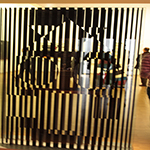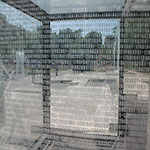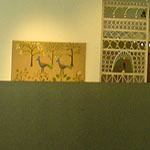Eurostars das Letras Hotel
Conference Room: Cervantes Rua Castilho 6-12 1250-069, Lisbon, PortugalConference program
- September 26, 2014
- 09:00 - 09:30Prticipant's Registration (Registration Desk – Cervantes Conference Room Foyer)
- 09:30 - 10:30Welcome and Opening Remarks - Open Floor Workshop: Europeanization, Crises and the Future of Integration
- 10:30 - 11:00Coffee Break and Snacks – Foyer
- 11:00 - 13:00Panel 1: The Politicisation of Europe: EU as a Political System, Supranational Order or Ever Closer Community
- 13:00 - 14:30Lunch at Eurostars Das Letras Restaurant
- 14:30 - 16:30Panel 2: The Persistence of the Democratic Deficit in the European Union
- 16:30 - 17:00Coffee Break and Snacks – Foyer
- 17:00 - 19:00Panel 3: Assessing the European Union’s External Influence: Foreign Policy and Normative Actorness
- 19:00 - 19:45Welcome Drink and Snack
- 19:45 - 21:30Optional Social Dinner
- September 27, 2014
- 09:00 - 11:00Panel 4: Cultural Diplomacy and Performing Identities
- 11:00 - 11:30Coffee Break and Snacks – Foyer
- 11:30 - 13:30Panel 5: European Union’s External Perception as a Transformative Power
- 13:30 - 15:00Lunch at Eurostars Das Letras Restaurant
- 15:00 - 16:30Panel 6: Educational Policies of Europeanization, Mobility ad Internationalization
- 16:30 - 17:00Coffee Break and Snacks – Foyer
- 17:00 - 19:00Panel 7: European Politics and Economic Development: Domestic and Regional Dimensions - Opportunities and Distortions for Integration
- 19:00 - 19:30Concluding Remarks and Discussions
- 19:30 - 21:30Optional Social Dinner
- September 26, 2014
The Third Euroacademia International Conference: The European Union and the Politicization of Europe

- Conference Description
- Participant’s Profile
- Registration and Fee
- Social Activities and Publication
- Important Dates
- Venue and Directions
- Conference Program
- Panel 1
- Panel 2
- Panel 3
- Panel 4
- Panel 5
- Panel 6
- Panel 7
The Third Euroacademia International Conference
The European Union and the Politicization of Europe
26 – 27 September 2014
Lisbon, Portugal
The European Union was described by Jacques Delors as an unidentified political object and by Jose Manuel Barroso as the first non-Imperial empire. The descriptors assigned to the European Union are creative and diverse yet the agreement on what is the actual shape that the EU is taking is by no means an easy one to be achieved. Historical choices shaped and reshaped the size and functioning of the EU while the goal of an emerging ‘ever closer union’ is still in search for the paths of real and not ideal accomplishment. The agreement seems to come when it’s about the growing impact of the decisions taken in Brussels on the daily lives of the European citizens and the increasingly redistributive outcomes of the policy choices inside the EU. These dynamics created the framework for the politicization of Europe and opened a vivid debate about the direction and proportions of such a process.
The politicization of Europe takes various shapes and addresses significant puzzles. While it is clear that the EU doesn’t resemble a state it is less clear if the decisions that shape its policies are configured by Pareto efficient outcomes or by dynamics that are intrinsic to a political system and defined by emerging party politics within the European Parliament. The democratic problem or the democratic deficit issue was and continues to be one of the main challenges facing the European Union in any terms or from any position is understood or described. The problem of accountability for the decision making inside the EU was there from the beginning and it emerged gradually as more emphatic on the agenda of vivid debates as the powers of the EU have grown after the Maastricht Treaty. This was concomitant with a growing disenchantment of citizens from member states with politics in general, with debates over the democratic deficits inside member states, with enlargement and with a visible and worrying decrease in voters’ turnouts at both national and especially European elections. The optimist supporters of EU believe in its power to constantly reinvent and reshape while the pessimists see either a persistence of existing problems or a darker scenario that could lead in front of current problems even to the end of the EU as we know it.
The Third Euroacademia International Conference ‘The European Union and the Politicization of Europe’ aims to survey some of these current debates and addresses once more the challenges of the EU polity in a context of multiple crises that confronted Europe in recent years. It supports a transformative view that involves balanced weights of optimism and pessimism in a belief that the unfold of current events and the way EU deals with delicate problems will put an increased pressure in the future on matters of accountability and will require some institutional adjustments that address democratic requirements for decision making. However in its present shape and context the EU does not look able to deliver soon appropriate answers to democratic demands. In a neo-functionalist slang we can say as an irony that the actual crisis in the EU legitimacy is a ‘spillover’ effect of institutional choices made some time before. To address the EU’s democratic deficit however is not to be a skeptic and ignore the benefits that came with it but to acknowledge the increasing popular dissatisfaction with ‘occult’ office politics and with the way EU tackles daily problems of public concern while the public is more and more affected by decisions taken at the European level.
Is the EU becoming an increasingly politicized entity? Is the on-going politicization of Europe a structured or a messy one? Do political parties within the European Parliament act in a manner that strengthens the view of the EU as an articulate political system? Are there efficient ways for addressing the democratic deficit issue? Can we find usable indicators for detecting an emerging European demos and a European civil society? Does a Europeanization of the masses take place or the EU remains a genuinely elitist project? Did the Lisbon Treaty introduced significant changes regarding the challenges facing the EU? Can we see any robust improvements in the accountability of the EU decision making processes? Are there alternative ways of looking at the politicization processes and redistributive policies inside the EU? These are only few of the large number of questions that unfold when researchers or practitioners look at the EU. It is the aim of the Third Euroacademia International Conference ‘The European Union and the Politicization of Europe’ to address in a constructive manner such questions and to offer o platform for dissemination of research results or puzzles that can contribute to a better understanding of the on-going process of politicization within the European Union.
Participant’s Profile
The conference is addressed to academics, researchers and professionals with a particular interest in Europe and European Union from all parts of the world. As the nature of the conference is intended to be multidisciplinary in nature different academic backgrounds are welcomed.
Post-graduate students, doctoral candidates and young researchers are welcomed to submit an abstract. Representatives of INGOs, NGOs, Think Tanks and activists willing to present their work with impact on or influenced by specific understandings of the European Union are welcomed as well to submit the abstract of their contribution.
Abstracts will be reviewed and the participants are selected based on the proven quality of the abstract. The submitted paper for the conference proceedings is expected to be in accordance with the lines provided in the submitted abstract.
The Registration is Closed
The participation fee includes:
- the registration fee
- all the materials for the conference
- eligibility for inclusion in the conference proceedings publications
- a copy of the electronic volume
- access to Euroacademia discussion group and newsletters
- discounted rates for participation in the future Euroacademia conferences
- coffee brakes with snacks and fruits for all the duration of the conference
- soft drinks for the whole duration of the conference
- welcome drink and snacks on 26th of September 2014
- a 3 course lunch on on 26th of September 2014 at 5* Restaurant Eurostars Das Letras
- a 3 course lunch on 27st of September 2014 at 5* Restaurant Eurostars Das Letras
- certificate of attendance
- access to the optional social program
A registration form will be sent to accepted participants that must be filled in and sent to [email protected] until 20th of August 2014 and until the 25th of August 2014, the payment of the participation fee through bank transfer is requested and considered as the final confirmation of attendance. No paper will be introduced in the program without confirmation and payment of the participant fee.
Unfortunately, Euroacademia has no available funds for covering transport and accommodation in Lisbon. Participants are responsible for finding funding to cover transportation and accommodation costs during the whole period of the conference. Official letters can be sent by Euroacademia to the financing institution to confirm the selection and participation in the conference upon request.
Social Activities and Publication
A specific spot in the conference program will be dedicated to social networking and therefore all the participants interested in setting or developing further cooperation agendas and prospects with other participants will have time to present and/or promote their project and express calls for cooperation.
A specific setting (Social Corner) for promotional materials connected with the topic of the conference will be reserved for the use of the participants. Books authored or edited by the participants can be exhibited and promoted during the whole period of the conference and can also be presented within the conference package based on prior arrangements.
An optional dinner and a social event will be organized for the first and second evening of the conference as optional program for the willing participants. The social dinner will be held based on participant’s confirmation and its costs are to be covered individually by the participants.
Publication:
Selected papers will be published in an electronic volume with ISBN after the confirmation of the authors and a double peer-review process based on an agreed publication schedule. All the papers selected for publication should be original and must have not been priory published elsewhere. All participants to the conference will receive a copy of the volume.
Important Dates
| Important Dates | |
|---|---|
| 1st of July 2014 | Deadline for submitting Panel Proposals |
| 1st of September 2014 | Extended Deadline for Paper Proposals |
| 2nd of September 2014 | Last notification of acceptance |
| 4th of September 2014 | Sending the Registration Form |
| 8th of September 2014 | Payment of the conference fee |
| 10th of September 2014 | Sending the draft paper to be uploaded on the web site of the conference |
| 15th of September 2014 | Publication of the conference program and uploading the draft papers on the website |
| 26th of September 2014 | The conference commences at 9.30 am |
Venue and Directions
The conference will take place in the conference premises of the exclusive 5 stars Hotel Eurostars das Letras, centrally located in the heart of Lisbon, easily accessible from the historic center and within a walking distance from all the major tourist attractions. Hotel Eurostars das Letras is a universe of culture and literature. A melting pot of languages and alphabets. A space specially thought out for people who enjoy reading. A hotel that lives and breathes literature. This is the Eurostars Das Letras, possibly the most literary hotel on the whole continent. Hotel Eurostars das Letras is one of the most rewarding and breakaway novelties that has happened in the last few years by the Tagus estuary. It is a luxury establishment where the secret ingredients of our recipe are blended in perfect proportions: design, top quality comfort, the latest in technological advances and, of course, literature and more literature.
Eurostars Das Letras Hotel
Rua Castilho 6-12 – 1250-069 Lisbon Portugal
Tel: + 35 1213 573 094,
email: [email protected]

Flanked by two large, emblematic Lisbon spaces, the Botanical Gardens and the Avenida da Liberdade, the Eurostars Das Letras enjoys a privileged location in the Portuguese capital, exactly at the point where the business city and the tourist and shopping areas meet.
An endless assortment of Lisbon attractions are available within walking distance from the main door of the hotel: Praça Marques de Pombal, Santa Justa, Bairro Alto and its cultural and night-time offers, the Chiado and its book stores, the Castle of Sao Jorge, Alfama, Rossío Square, Praça do Comércio, Praça do Municipio, Rua da Prata, Graça, Lapa and even the streets close to the Benfica area.
The hotel is surrounded by excellent restaurants and boutiques, such as Hugo Boss, Louis Vuiton or Cartier. By public transport, the hotel is easily accessible from the Airport, Santa Apolonia Station and other emblematic places in the city, like the Belem district or the Parque das Naçoes, with the Estaçao de Oriente designed by Santiago Calatrava or the impressive Oceanarium.
See full information about the conference Location & Map:
HERE
Conference participants are responsible for arranging the accommodation and travel. However, discounted rates for the Eurostars Das Letras Hotel can be arranged by organizers and announced to selected participants upon request.
Conference Program
See the conference panels with abstracts below by clicking on the panel numbered tabs.
The Politicisation of Europe: EU as a Political System, Supranational Order or Ever Closer Community
- It Walks Like a State and Talks Like a State But It’s Not a State: A Contribution to European Political Order TheoryThis research addresses the issue of creating a comprehensive theory of EU’s territorial order construction. In an effort to determine the underlying conditions for the construction of a supranational shared political space, I am tackling the question: What do Europeans say about their community when they talk about the enlargement?Marie-Ève Bélanger, Center for Comparative and International Studies, ETH Zurich
- The 2014 European Elections. New Players, New Rules, New Battlefield: A New Game?With the aim of extending the existing literature on EP elections, the objective of this paper is to assess whether and to which extent the May 2014 elections differ from the previous voting. Against the background of the euro zone crisis and the spread of Euroscepticism, a study of sensitive proceedings in light of the electoral outcomes, will provide an interesting reflection on the rising importance of European issue in contemporary European politics.Maria Giulia Amadio Viceré, Luiss University, Rome, Italy
- Tracing the Gender Gap in Public Support for European Membership I develop a theoretical framework which is designed to identify the roots of the gender gap. The preliminary results of my analyses indicate that material conditions and gender-specific socialization of men and women both play a role for the gender gap in public opinion on the EU.Gitta Glüpker-Kesebir, Koc University, Turkey
- The Eurozone Crisis and the European Union’s Multiple Identity CrisesThis paper argues that there multiple and distinct, yet interrelated ways of interpreting the current identity crisis of the EU. This paper focuses on four particular kinds of crisis.Ioanna Ntampoudi, Aston University, Birmingham, UK
- The European Union: Politicisation of Europe?The paper recurs to semiotic analysis and interpretation of facts and developments as signs and in doing so extrapolates an earlier paper under the title of "semioses regarding politics and economy“, in its days early predicting and explaining the roots of the financial crash of 2008 into present and future.Gerhard Eichweber, Value Group, Switzerland
The Persistence of the Democratic Deficit in the European Union
- The Issue of Democratic Deficit and the Idea of a Common European EthosThe paper then dwells on the idea of a common ethos and elucidates it as part of human collective identifications and relates it to substance rather than procedure. It concludes with the argument that the so-called democratic deficit of the EU cannot be explained with reference to the absence of a common European ethos.Ahmet Nuri Yurdusev, Middle East Technical University, Ankara, Turkey
- The Unintended Consequences of Intergovernamentalism: ECB and Institutional Change in the EurocrisisThe paper stems from the analysis of the limits of intergovernamentalism identified by Fabbrini (2013), arguing that the ECB gained further powers being the only European institution able to bypass those limits.Alessio Sacchi, IMT Institute of Advanced Studies, Lucca, Italy
- Interest Representation: Can Lobbying Regulation Help EU Overcome Democratic Deficit?Recent elections to the European Parliament has raised the question of interest groups involvement in the electoral process. But there is no clear data on their, in contrast to other political actors, influence on the outcome of elections as well as the level of democratic legitimacy.Daria Rudenkova, Institute of World Economy and International Relations, Russian Academy of Sciences, Moscow
- Failure of the Common European Migration and Asylum Policy and the EU’s Democratic Legitimacy: The Member States Left Holding the Sack!?Our research aims to unfold the problem of the EU’s democratic legitimacy by analyzing the developments in its Common Migration and Asylum Policy, which by the civil society, and NGOs like Amnesty International and Human Rights Watch is held accountable for the recent tragedies in the Mediterranean Sea, at the island of Lampedusa and Malta.Mészáros Edina Lilla, Babes-Bolyai University, Romania
- How Enlightened is the European Despotism? The Persistence of the Democratic Deficit in the European UnionThere is a wide variety of denominators for the EU in addressing its political structures of decision making and its inherent democratic deficit features, and yet there is still room for conceptual innovation. The democratic problem or the democratic deficit issue was and continues to be one of the main challenges facing the European Union in any terms or from any position is understood or described.Emanuel Crudu, Euroacademia (Paris, Lucca & Brussels)
Assessing the European Union’s External Influence: Foreign Policy and Normative Actorness
- In Search of a Role for the High Representative: The Legacy of Catherine AshtonThe analysis examines the main themes of Ashton’s role performance in her five years in office(including among others the set-up of the European External Action Service, crisis management, Iran and Ukraine)and matches them against four role expectations: co-leader, broker, manager and diplomat.Niklas Helwig, Finnish Institute of International Affairs, Helsinki, FinlandCarolin Rüger, Department of Political Science and Sociology, University of Würzburg, Germany
- The European Union as an Unidentified Political Object? The International Player in Search of a Strategic CultureHow are we able to recognize a certain actor or player when we see it? And more important, how these characteristics distinguish the EU from other actors in the international system?Ana Isabel Xavier, FCSH-Nova, and NICPRI - Research Unit in Political Science and International Relations, Minho University, Portugal
- A Realist Approach to the European Neighbourhood Policy: The Case of Russian Intervention in UkraineThis paper argues that although the ENP has been an effective policy in providing a peaceful environment around Europe, implementation of its instruments should take into account the priorities of and respect to the vital interests of other major actors in the related regions.Emirhan Göral, Marmara University EU Institute, Istanbul, Turkey
- More European Integration and Reform in the Eastern Neighborhood: Is the Moldovan Parliament a Real Player?The paper aims at exploring to what extent the democratic deficit concept is applicable in the case of Moldova, whether the Moldovan parliament is loser in the European integration issues and policy making, how effective is the legislative-executive-civil society-public at large relationship and communication on the EU-Moldova affairs.Natalia Colesnic, Moldova State University, Republic of Moldova
- New Challenges of the European Foreign Policy in the Context of the Western Balkan RegionThis different position of the Western Balkans countries, on the one hand, and of the EU institutions, on the other, is actually a new challenge not only for the EU, but also for the countries in the region.Tanja Karakamisheva- Jovanovska, Faculty of Law “Iustinianus Primus” in Skopje, Republic of Macedonia
Cultural Diplomacy and Performing Identities: From Literature to Visual Urban Spaces
- UNPUBLIC SPACES OF EUROPE (U.S.E.) – On Places, Non-Places and Other Spaces of the European Contemporary CityIf today, undoubtedly, urban daily life is both linked to the use of public spaces and shopping centers; it’s not surprising that phenomena such as urban tribes, sport celebrations, strikes or political demonstrations are both visible in city squares and shopping center plazas, where these are increasingly more and more common.Miguel Silva Graça, Centro de Investigação do Território, Transportes e Ambiente – Universidade de Coimbra (CITTA-UC), Portugal
- Exhibition Becomes Politics. How Art Exhibitions About the Ukrainian Crisis Bring Up Diplomatic ContradictionsAs the paper will demonstrate, the exhibitions result in contradictions in terms of the higher purpose of cultural diplomacy, updating a persistent narrative of the barbaric East as enemy stereotype. The paper is complemented by a short methodological chapter which suggests a broader theoretical approach to cultural diplomacy.Sebastian Loewe, Martin-Luther University, Halle-Wittenberg, Germany
- Festivals for Europe: Analysing the Meaning and Function of Europe in Contemporary Cultural Festivals – Between Prestige Seekers & Political ActivistsThis paper asks for the meaning and function of Europe in two very different cultural festivals that explicitly brand themselves as European. The methodological premise of the analysis is the significance of festivals in society - their communicative and community-building capacity (especially in regards to the nation), their function as space for sociability, and their contemporary post-traditional and cosmopolitan character.Roch Dunin-Wasowicz, European Institute, London School of Economics and Political Science
- The Relevance of Work for the Perception of Identity in Yoko Tawada’s Prose WritingYoko Tawada describes in her narratives precarious, demanding, wearing or uncertain job situations, which have consequences for the awareness of identity and the self-consciousness of her protagonists. The arrival and stay in a foreign country – a characteristic setting of Tawada's prose writing – challenge this awareness.Yvonne Dudzik, Ruhr-University Bochum, Germany
European Union’s External Perception and Impact as a Transformative Power
- The EU’s Profile in Northeast AsiaThough still secondary to the US, Japanese and Korean expectations of the EU as a political actor have been significantly upgraded, with a corresponding intensification of political collaboration. In the case of China, the EU continues to be viewed as a key strategic partner in facilitating China’s development, but the Union’s own strategy for inducing political reforms in China is not effectively served by the existing framework.David Hallinan, School of Politics and International Relations, University College Dublin
- The EU’s Participation In Global Financial GovernanceIn this paper the concept of multilevel governance is employed to emphasize the space dimension of political governance, as well as specific importance of liaisons, coalitions and interactions, which transcend territorial borders and go beyond spheres of national control.Marina Strezhneva, Institute of World Economy and International Relations, Russian Academy of Sciences, Moscow
- Does Speed Matter? The Impact of the EU Membership Incentive on Rule Adoption in Minority Rights LegislationBased on the External Incentives Model of Governance, this hypothesis-testing article seeks to explain how effective the EU membership incentive is on recipient states’ propensity to comply with EU minority rights conditionality.Anna Parkhouse, Dalarna University, Sweden
- Where Does the Europeanisation of CEEC Security Discourse Stop? A Case Study of RomaniaThe paper will show through the discourse analysis of Romanian security policy how this process – also present in other EU border countries - is relevant to the direction in which EU security policy might develop over the next years.Iulia Joja, National School for Political and Administrative Studies, Bucharest, Romania
Educational Policies of Europeanization, Mobility and Internationalization
- A Comparative Perspective of Romanian and British International Students Between, “brain gain” and “brain drain”, in the internationalization and globalization era, our article aims to present the differences between the students of these two countries, and offer tools as to how more students could be made aware of chances to study internationally.Loredana Denisa Lastun, University Of Oradea, RomaniaSimon Parker, University of Essex, UK
- Social Agents, National States and International Institutions: Educational Policies of Europeanisation and the Restructuring of Higher Education in Turkey through the Bologna ProcessThe study aims to address the architecture of transnational governance in the restructuring process of higher education in Turkey, which has been engaged in the Bologna objectives as a signatory country since 2001.Damla Asli Altan, Istanbul University, Turkey
- One Way Out of the Crisis through Higher Education and Research Policies for GrowthIn my paper I will focus on the role of higher education and research policies in acting as a driving force for economic recovery, by addressing the following questions both from a researcher and practitioner's perspective.Diana Adela Martin, University of Groningen/LEAP-Link Education and Practice
European Politics and Economic Development: Domestic and Regional Dimensions – Opportunities and Distortions for Integration
- Crisis, Revised Economic Theory and Open Society: Euregio or Convergence?Based on insight relating contradicting economic theories to context strongly linked to culture and the treatment of qualitative distinction and diversity in society and politics, this paper sheds a light on counterproductive paradigms as well as on proven practice of a sustainable turnaround of the Basque Country as example for other regions and their societies.Gerhard Eichweber, Value Group, Switzerland
- The Greek ‘Underdog’ Political Culture: An Anti-European Political Identity?Through the presentation of empirical findings based on focus groups and personal in-depth interviews in Greece, this paper argues that the distinctly democratic political identities that the EU strives to create and maintain as part of its own desired political identity as a specifically democratic institution, are paradoxically the same kind of identities that resist and challenge its direction and the course of European integration.Ioanna Ntampoudi, Aston University, Birmingham, UK
- National Accounts Versus Business Accounting: Form and ContentThus, the state's objective to stimulate economic growth, it can be targeted by harmonization of national accounting standards with the International Financial Reporting Standards, the IFRS rules for a comparable global business and also by full implementation of System of National Accounts, the SNA/ESA rules for comparable country world statistics.Nicoleta Andreea Savu, Bucharest University of Economic Studies, Romania
- Investigating Speculation in the Components of the Quarterly GDP Growth Rate: Albania’s Case 2005-2013The main objectives of the present study are to detect the speculation in components of the quarterly GDP growth rate in Albania during the period January 2005- September 2013 and to evaluate the level of speculation for each component of the quarterly GDP growth rate, using the criteria C1, C2, as well as Gelfand’s classification.Fejzi Kolaneci, University of New York in Tirana, AlbaniaSuada Basho, University of New York, Tirana, AlbaniaEldi Berhamaj, University of New York, Tirana, Albania











.jpg)
.jpg)




.jpg)


.jpg)




































